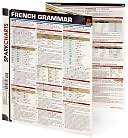Merde! : The Real French You Were Never Taught at School
Preface\ Do you remember when you were learning French at school and looked in vain through your dictionary for all the dirty words? Have you thought you had a reasonable command of the language, then seen a French film or gone to France only to find that you could barely understand a word? You were, of course, never taught real French by your boring teachers, who failed to give you the necessary tools of communication while stuffing the subjunctive imperfect down your throat. French argot...
Search in google:
PrefaceDo you remember when you were learning French at school and looked in vain through your dictionary for all the dirty words? Have you thought you had a reasonable command of the language, then seen a French film or gone to France only to find that you could barely understand a word? You were, of course, never taught real French by your boring teachers, who failed to give you the necessary tools of communication while stuffing the subjunctive imperfect down your throat. French argot (slang) is not just the dirty words (though, have no fear, you will find them here); it is an immensely rich language with its own words for very ordinary things, words that are in constant use. Here, then, is not an exhaustive or scholarly dictionary of argot (that would be ten times thicker) but a guide to survival in understanding everyday French as it is really spoken.GuidanceAsterisks after argot words indicate a degree of rudeness above the ordinary colloquial. Two asterisks show a whopper, although you should not assume that strength and rudeness cause a word to be used less frequently; au contraire.When an English definition is underlined, that definition gives a good equivalent flavor, feeling and degree of rudeness of the French word. Good equivalents are not that common, so rely generally on the English definition for the meaning of the French word, on the asterisks for its strength and on the many examples for its usage. Just remember, to be authentic is to be rude.Copyright © 1984 by Geneviève Edis Publishers Weekly Written by ``Genevieve,'' who is identified only as living in Switzerland, this humorous look at French argot claims to be a ``survival guide to understanding everyday French as it is really spoken.'' While there is certainly much for the casual reader to enjoy and much for lovers of France to commit to memory, the book falls flat. The fun of learning slang in a foreign language is understanding the sometimes mystifying, often amusing, literal meanings of those expressions. For example, according to Genevieve, an innocent, naive person is a oie blanche, a white goose, and to make love in a slow, conventional way is faire l'amour a la papa, make love like dad. Unfortunately this guide only erratically provides such literal meanings, making the book of full value only to those whose French is in good shape already or who are willing to paw through a conventional dictionary while reading this. (March)
Preface\ Do you remember when you were learning French at school and looked in vain through your dictionary for all the dirty words? Have you thought you had a reasonable command of the language, then seen a French film or gone to France only to find that you could barely understand a word? You were, of course, never taught real French by your boring teachers, who failed to give you the necessary tools of communication while stuffing the subjunctive imperfect down your throat. French argot (slang) is not just the dirty words (though, have no fear, you will find them here); it is an immensely rich language with its own words for very ordinary things, words that are in constant use. Here, then, is not an exhaustive or scholarly dictionary of argot (that would be ten times thicker) but a guide to survival in understanding everyday French as it is really spoken.\ Guidance\ Asterisks after argot words indicate a degree of rudeness above the ordinary colloquial. Two asterisks show a whopper, although you should not assume that strength and rudeness cause a word to be used less frequently; au contraire.\ When an English definition is underlined, that definition gives a good equivalent flavor, feeling and degree of rudeness of the French word. Good equivalents are not that common, so rely generally on the English definition for the meaning of the French word, on the asterisks for its strength and on the many examples for its usage. Just remember, to be authentic is to be rude.\ Copyright © 1984 by Geneviève Edis
\ Publishers Weekly\ - Publisher's Weekly\ Written by ``Genevieve,'' who is identified only as living in Switzerland, this humorous look at French argot claims to be a ``survival guide to understanding everyday French as it is really spoken.'' While there is certainly much for the casual reader to enjoy and much for lovers of France to commit to memory, the book falls flat. The fun of learning slang in a foreign language is understanding the sometimes mystifying, often amusing, literal meanings of those expressions. For example, according to Genevieve, an innocent, naive person is a oie blanche, a white goose, and to make love in a slow, conventional way is faire l'amour a la papa, make love like dad. Unfortunately this guide only erratically provides such literal meanings, making the book of full value only to those whose French is in good shape already or who are willing to paw through a conventional dictionary while reading this. (March)\ \








